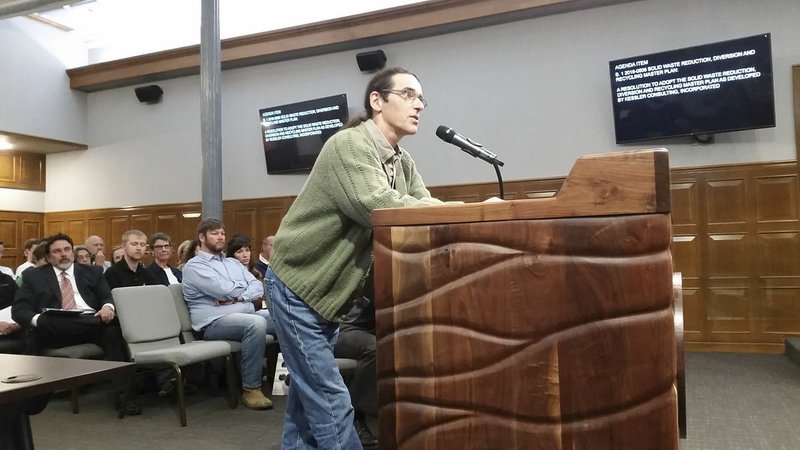FAYETTEVILLE -- The city has taken its first steps to double the amount of trash it keeps out of the landfill.
The City Council on Tuesday voted 8-0 to adopt an amended version of the Solid Waste Reduction, Diversion and Recycling Plan from Florida-based Kessler Consulting. The plan calls for diverting 40 percent of the city's waste from the landfill by 2027.
Next meeting
5:30 p.m. March 7
Room 219, City Hall
113 W. Mountain St.
Read the plan
To read the Solid Waste Reduction, Diversion and Recycling Master Plan, go to:
bit.ly/faytrashmasterplan
The 100-plus-page plan consists of three sections focusing on recycling, compost and construction bulk waste.
In December 2013, the council set a goal to divert 80 percent of its trash from the landfill and later hired Kessler to come up with a plan. The city's diversion rate has stayed around 20 percent for the past decade, according to the consultants.
The amendment halves that goal and changes the schedule of the plan's implementation.
The city will first prioritize adding organics, such as food waste, to its compost program, which currently is only permitted to accept yard waste. It also will request proposals for an outside company to collect construction and demolition waste.
Some multi-family residences, such as townhouses, triplexes and apartments up to 24 units with street frontage also soon will have curbside recycling pick-up made available to them.
More than 20 people addressed the council Tuesday, some showing support for the single-stream method of recycling but with most strongly against the idea. The amended plan sets aside, for the immediate future anyway, the single-stream method that Kessler recommended.
Single stream would have residents place all recyclables in a single container which would then go into a one-compartment truck to be hauled and eventually sorted at a specialized material recovery facility. City employees currently sort recyclables at the curb.
Louise Mann, an outspoken critic of the method, said the city should include more "end-users," or the companies who turn recyclable trash into something usable, in its discussions. She also criticized the idea of doing something just because it's easier, echoing many other residents' sentiments single stream greatly increases the amount of contamination in otherwise recyclable material.
"Is that really how we want to raise our children? Children only do those things which are convenient?" she said. "Come on, you all. Fayetteville is a whole lot better than this."
Mayor Lioneld Jordan said it was tough for him to see the issue divide the community.
"We got into this and toward the end it became so controversial and I thought at the end of the day everybody wants the same thing -- a good recycling program," he said. "We want to do what we think is right, and there's different opinions and that's what makes the city what the city is."
Kelly Mulhollan was among several residents critical of the single-stream method, saying he didn't understand how people could support single stream with plenty of information available on the Internet showing the method doesn't meet an adequate expectation.
"It's music to my ears to hear the city representatives here speaking," he said. "It sounds like they're on the right track and take great pride in what they've already been doing."
Andrew Miles, vice chairman of the city's Environmental Action Committee, supported the amended plan but said it was important to continue pursuing regional support for a state-of-the-art material recovery facility.
"The overall tonnage does offset that contamination," he said. "Whichever way you go in a few years when we bring this issue back up with a resolution, when single stream -- if single stream -- does become an option, that'll be discussed then."
Robyn Reed, executive director of the Boston Mountain Solid Waste District, expressed support for a regional facility. Other municipalities in Northwest Arkansas contract their trash and recycling services.
Transportation Services Director Terry Gulley said the city's resources to collect recyclable material already have been stretched thin and a new rate study to determine what equipment and how many people the city needs to carry out services is badly needed.
"The main thing we need to address more than anything is a resolution of some type of direction of how you want us to go," he said.
Alderman Matthew Petty said the magnitude of what the council passed Tuesday, namely collecting construction and demolition debris for recycling and organic waste for compost, shouldn't get lost in the politics. Both supporters and advocates against single stream might remain disappointed, he said.
"The truth of the matter is we're taking a huge step -- a bigger step than any other city in Arkansas has ever taken or most of the cities in the midwest," he said.
NW News on 02/22/2017

